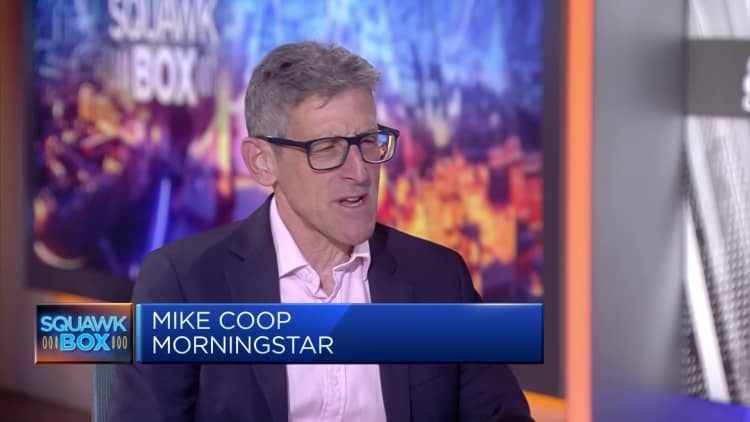An AI (Artificial Intelligence) sign is seen at the World Artificial Intelligence Conference (WAIC) in Shanghai, China July 6, 2023.
Aly Song | Reuters
Market participants are “overconfident” about their ability to predict the long-term effects of artificial intelligence, according to Mike Coop, chief investment officer at Morningstar Investment Management.
Despite a pullback so far this month, optimism about the potential of AI to drive future profits has powered the tech-heavy Nasdaq Composite to add more than 31% year to date, while the S&P 500 is up by more than 16%.
Some analysts have suggested that a bubble effect may be forming, given the concentration of market gains in a small number of big tech shares. Nvidia stock closed Thursday’s trade up 190% so far this year, while Facebook parent Meta Platforms has risen more than 154% and Tesla 99%.
“If you look back at what’s happened over the last year, you can see how we’ve got to that stage. We had the release of ChatGPT in November, we’ve had announcements about heavy investment in AI from the companies, we’ve had Nvidia with a knockout result in May,” Coop told CNBC’s “Squawk Box Europe” on Friday.
“And we’ve had a dawning awareness of how things have sped up in terms of generative AI. That has captured the imagination of the public and we’ve seen this incredible surge.”

In a recent research note, Morningstar drew parallels between the concentration of huge valuations and the dot-com bubble of 1999, though Coop said the differentiating feature of the current rally is that the companies at its center are “established giants with major competitive advantages.”
“All of our company research suggests that the companies that have done well this year have a form of a moat, and are profitable and have sustainable competitive advantages, compared with what was happening in 1999 where you had lots of speculative companies, so there is some degree of firmer foundations,” Coop said.
“Having said that, the prices have run so hard that it looks to us that really people are overconfident about their ability to forecast how AI will impact things.”
Drawing parallels to major technological upheavals that have realigned civilization — such as electricity, steam and internal combustion engines, computing, and the internet — Coop contended that the long-run effects are not predictable.
“They can take time and the winners can emerge from things that don’t exist. Google is a good example of that. So we think people have got carried away with that, and what it has meant is that the market in the U.S. is very clustered around a similar theme,” he said.
“Be mindful of what you can really predict when you’re paying a very high price, and you’re factoring in a best case scenario for a stock, and be cognizant of the fact that as the pace of technological change accelerates, that also means that you should be less confident about predicting the future and betting heavily on it and paying a very high price for things.”
In what he dubbed a “dangerous point for investors,” Coop stressed the importance of diversifying portfolios and remaining “valuation aware.”
He advised investors to look at stocks that are able to insulate portfolios against recession risks and are “pricing in a bad case scenario” to the point of offering good value, along with bonds, which are considerably more attractive than they were 18 months ago.
“Be cognizant of just how high a price is being paid for the promise of what AI may or may not deliver for individual companies,” Coop concluded.
Correction: This story was updated to reflect the year-to-date change of the Nasdaq Composite stood at 31% at the time of writing.
